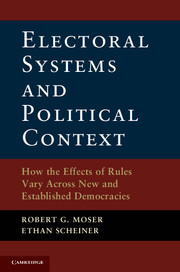Electoral Systems and Political Context How the Effects of Rules Vary Across New and Established Democracies
Auteurs : Moser Robert G., Scheiner Ethan

Ethan Scheiner is Professor of Political Science at the University of California, Davis. He is the author of Democracy without Competition in Japan. His articles have appeared in the American Political Science Review, the Annual Review of Political Science, the British Journal of Political Science, Comparative Political Studies, Electoral Studies, the Japanese Journal of Political Science, the Journal of Japanese Studies and Legislative Studies Quarterly.
Date de parution : 09-2012
Ouvrage de 303 p.
15.5x23.8 cm
Disponible chez l'éditeur (délai d'approvisionnement : 14 jours).
Prix indicatif 36,76 €
Ajouter au panierDate de parution : 09-2012
Ouvrage de 304 p.
16.2x24.1 cm
Disponible chez l'éditeur (délai d'approvisionnement : 14 jours).
Prix indicatif 77,68 €
Ajouter au panier


